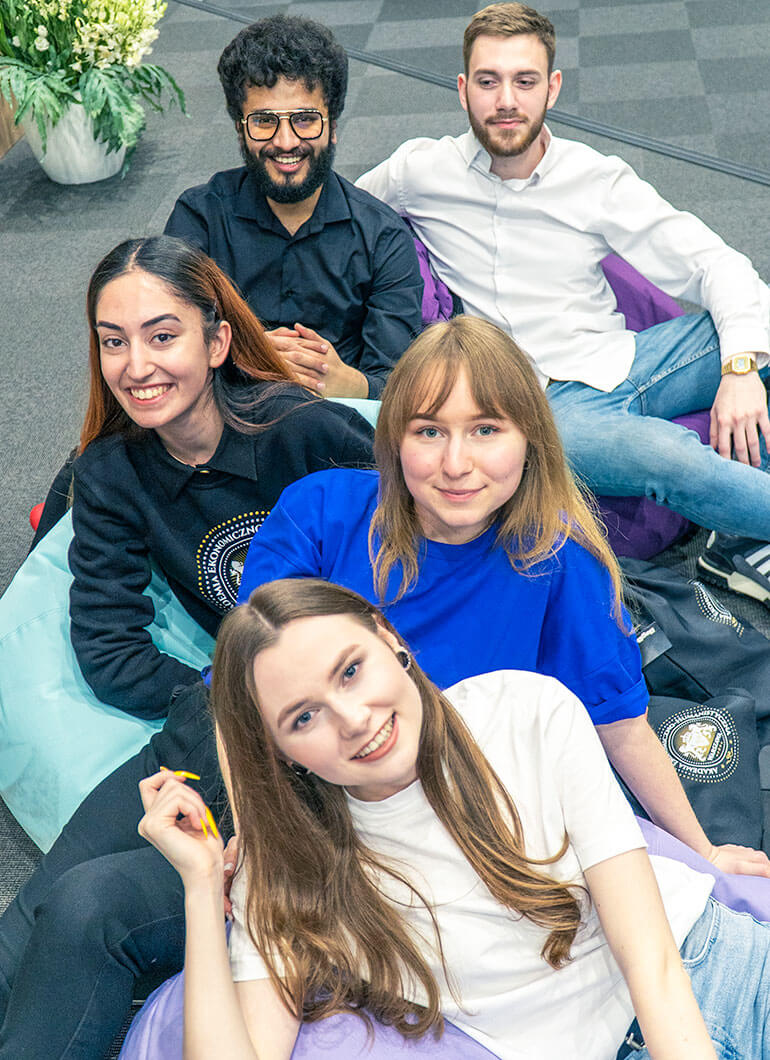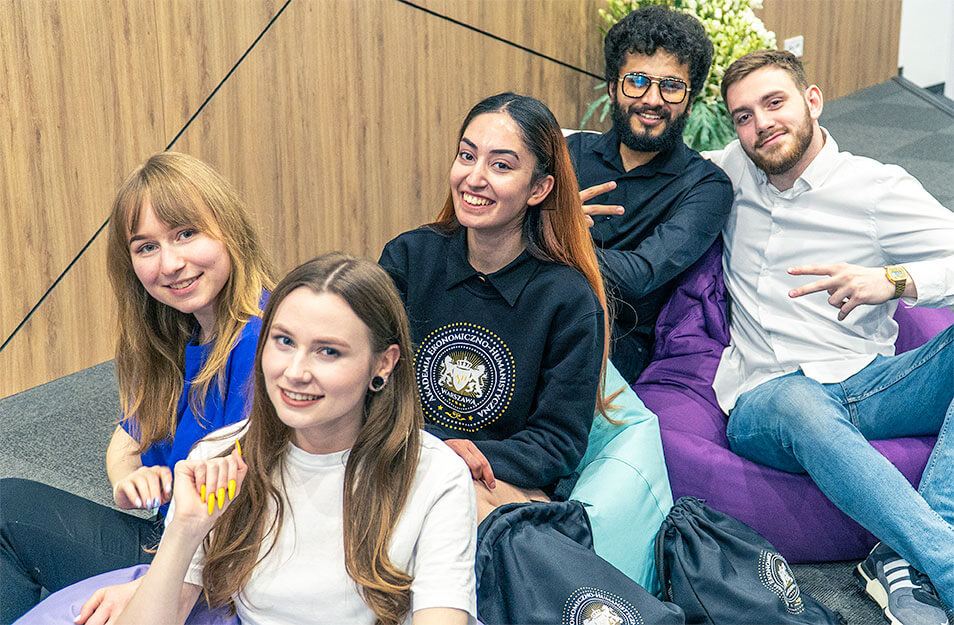Animal upbringing and training
Undergraduate (Bachelor)
Animal behavior and psychology
Why choose this field of study?
Do you love animals and find contact with them fun and rewarding? Explore a course of study that will allow you to:
– understand animal behavior and needs based on scientific knowledge;
– get a profession that will not chain you to a desk 😉
– help animals and people build relationships with each other… and thus change the world for the better!
The study of practical profile on the course Animal behavior and psychology at the VIZJA University was created for animal lovers who want to turn their passion into a valuable professional qualification – future behaviorists, conscious breeders, trainers, employees of shelters or horse studs. If you see yourself in such a job, you have just found the direction for you!
The study program combines knowledge from the field of psychology – mainly cognitive and behavioral – with selected issues in zoology and ethology (science of behavior) of domesticated animals: dogs, cats, horses, rodents or birds. A key part of the education is the acquisition of practical skills, so from the 2nd semester you will participate in classes that build a workshop for working with animals.
Choosing Animal upbringing and training specialty, you will focus, among other things, on the methodology of training and training dogs and horses, solving behavioral problems of pets or the realities of running a business related to the care and training of animals.
For this major, you can also choose an alternative specialization in animal therapy – see Animal therapy.
Animal behavior and psychology, undergraduate studies – what sets us apart?
- You will learn to understand and interpret animal behavior and language based on in-depth psychological knowledge provided by prominent UEHS lecturers.
- You will participate in numerous workshops, as well as observation practices and field exercises at renowned animal care and training centers.
- You will learn about ethical, legal and business issues necessary to conduct business related to your field of study and chosen specialty.
Animal upbringing and training – what can you do after graduation?

A degree in education will allow you to find employment or develop your own business in areas such as:
- training dogs or horses in professional training/riding schools and centers;
- training of service and assistance dogs;
- consultation and behavioral therapies for pet owners;
- socialization and preparation for adoption of animals residing in shelters and rehabilitation centers;
- conducting breeding of pedigree animals;
- professional petsitting and operation of animal hotels;
- social and educational activities for the benefit of animals.
This program
is for you if:
You want to combine your love for animals with your professional work.
You are an empathetic, patient, insightful and responsible person.
You are keen to acquire a practical workshop of an animal behaviorist, which will be supported by in-depth psychological knowledge at the academic level.



Admission rules and regulations
Note: important information for 2025 candidates
Please read carefully the application procedures in line with the changes introduced by the Polish Ministry of Science and Higher Education in 2025.
Programme and structure of studies
UNDERGRADUATE STUDIES
(BACHELOR’S DEGREE)
The bachelor’s degree program with a practical profile in the field of Animal behavior and psychology at UEHS allows you to acquire the directional substantive knowledge and build a workshop of skills necessary for behavioral work with animals. Graduates receive a bachelor’s degree and are fully prepared to develop professional activities.
FIRST YEAR OF STUDY
The first semester of study provides the theoretical basis for understanding further directional issues. In the second semester, the student explores the knowledge of psychology, anatomy, physiology and ethology of animals, as well as the first observation practice.
SEMESTER I
| Subject name | Cummulative amount of ECTS points | Cummulative amount of hours (FT/PT) |
|---|---|---|
| Health and Safety | 0 | 8/8 |
| Academic Skills | 1 | 15/8 |
| General Education | 5 | 30/16 |
| Introduction to Philosophy | 5 | 35/20 |
| Introduction to Psychology | 5 | 30/24 |
| Basic Social Communication | 4 | 30/24 |
| Genetics | 4 | 30/16 |
| Zoology | 3 | 30/16 |
| Animal Welfare | 3 | 30/16 |
SEMESTER II
| Subject name | Cummulative amount of ECTS points | Cummulative amount of hours (FT/PT) |
|---|---|---|
| Sports and Recreation | 0 | 30/0 |
| Foreign Language (I) (Elective) | 2 | 30/16 |
| Research Methodology | 4 | 30/16 |
| Emotions and Motivation | 4 | 60/40 |
| Biological Basis of Behavior | 4 | 60/40 |
| Cognitive Processes | 4 | 60/40 |
| Ethology | 4 | 60/40 |
| Animal Anatomy and Physiology | 4 | 60/32 |
| Internship (I) - Observational-Participatory Practice | 4 | 120/120 |
SECOND YEAR OF STUDY
The second year of study is devoted to the further development of directional knowledge – with particular emphasis on workshop classes and observational and professional practice.
SEMESTER III
| Subject name | Cummulative amount of ECTS points | Cummulative amount of hours (FT/PT) |
|---|---|---|
| Sports and Recreation | 0 | 30/0 |
| Foreign Language (II) (Elective) | 2 | 30/16 |
| Animal Disease Prevention and Prevention | 5 | 60/32 |
| Dog Behavioral Problems | 3 | 30/16 |
| Animal Breeding | 3 | 30/16 |
| Ethics of Contact with Animals and Human Attitudes Toward Animals | 3 | 30/16 |
| Basic Animal Education and Training | 5 | 60/32 |
| Animal Nutrition | 5 | 35/20 |
| Internship (II) - Observational-Participatory Practice | 4 | 120/120 |
SEMESTER IV
| Subject name | Cummulative amount of ECTS points | Cummulative amount of hours (FT/PT) |
|---|---|---|
| Foreign Language (III) (Elective) | 2 | 30/16 |
| Basics of Psychological Assistance | 5 | 30/16 |
| Quantitative Methods - Statistics | 4 | 60/40 |
| Introduction to Animal Therapy | 4 | 60/32 |
| Comparative Psychology | 3 | 30/16 |
| Pre-Veterinary First Aid | 2 | 15/8 |
| Pre-Medical First Aid | 1 | 15/8 |
| Cats behavioral problems | 2 | 30/16 |
| Horse behavioral problems | 3 | 30/16 |
| Internship (III) (Elective) | 4 | 120/120 |
THIRD YEAR OF STUDY
The third year is dominated by subjects specific to the specialty of Animal upbringing and training. This is also the time for continuing internships and preparing for the diploma exam.
SEMESTER V
| Subject name | Cummulative amount of ECTS points | Cummulative amount of hours (FT/PT) |
|---|---|---|
| Foreign Language (IV) (Elective) | 3 | 30/16 |
| Psychopathology | 4 | 30/24 |
| Legal Protection of Animals | 2 | 30/16 |
| Rodent and Rabbit Behavior | 2 | 15/8 |
| Dog and Horse Training and Training Methodology | 4 | 45/24 |
| Dog Behavioral Therapies and Case Studies | 3 | 45/24 |
| Cat Behavioral Therapies and Case Studies | 3 | 30/16 |
| Internship (IV) (Elective) | 6 | 180/180 |
| Project Preparation Methodology | 3 | 30/16 |
SEMESTER VI
| Subject name | Cummulative amount of ECTS points | Cummulative amount of hours (FT/PT) |
|---|---|---|
| Interpersonal Communication Training | 4 | 30/16 |
| Training of Service and Therapy Horses | 4 | 45/24 |
| Training of Assistance and Service Dogs | 4 | 45/24 |
| Equine Behavioral Therapies and Case Studies | 4 | 45/24 |
| Running a Business Related to Animal Training and Care | 3 | 15/8 |
| Internship (V) (Elective) | 6 | 180/180 |
| Social Project | 5 | 60/32 |
The content of the study program may change as a result of efforts to improve the quality of education and adapt the teaching offer to the current challenges of the labor market. Each change is approved by the University Senate and introduced with the aim of preparing students for their future careers in the best possible way.
Tuition fees
Fixed tuition - flexible payments
By choosing to study at VIZJA University, you can be sure that the tuition fee will not change throughout the duration of your studies. You can pay the tuition fee once for the entire year of study or spread over a semester payment. This allows you to decide how you want to plan your expenses.

Fees (academic year 2025/2026)
EU&OTHER COUNTRIES GROUP
| Year of study | Annually | Per semester* |
|---|---|---|
| I | 2800 € | 1550 € |
| II | 2800 € | 1550 € |
| III | 2800 € | 1550 € |
*Semester payment is possible from the second year of studies.
OTHER COUNTRIES
| Year of study | Annually | Per semester* |
|---|---|---|
| I | 3800 € | 2050 € |
| II | 3800 € | 2050 € |
| III | 3800 € | 2050 € |
*Semester payment is possible from the second year of studies.
EU and other countries group
This group includes citizens of the countries member states of the European Union and the following countries citizens: Azerbaijan, Belarus, Bosnia and Herzegovina, Montenegro, Georgia, Kazakhstan, Kosovo, Kyrgyzstan, Latin America, Macedonia, Moldova, Norway, Russia, Serbia, Tajikistan, Turkey, Turkmenistan, Ukraine, Uzbekistan.
Other countries
The citizens of all the remaining countries.
Study in Polish!
Do you want to study at VIZJA University in Polish? It is possible! We have prepared a special program for international students to acquire the skills necessary for active study in Polish and for academic, social and everyday life in Poland.
The Comprehensive Polish Language Program for International Students is:
- part of The VIZJA University Foundation Program, which is a comprehensive preparation for starting regular Bachelor's or Master's studies in Polish at VIZJA University
- a course aimed at two groups of international students: students with knowledge of a Slavic language (Russian, Ukrainian, Czech etc.) and students without prior knowledge of any Slavic language
- a chance for immersion in Polish society and culture, authentic experience of life in Poland and broad career prospects on the Polish labour market
More details coming soon!
Scholarships - easier than you think

While studying at VIZJA University, you can take advantage of a wide range of financial support from the state budget and European funds, as well as benefit from special discounts with VIZJA University discount program
You can submit most scholarship applications quickly and easily through your online account.
In the academic year 2023/2024, VIZJA University awarded 800 Rector’s Scholarships, ranging from PLN 400 /month to PLN 1000 /month, depending on the average or achievements. For outstanding sport, artistic or scientific achievements, the Scholarship Committee awarded scholarships of PLN 600 /month.
Detailed information on the possibility of applying for the Rector’s Scholarship is available in the dean’s system.
A sports scholarship may be awarded to a student who excels in sport achievements at least national level. In addition we also encourage our students to take part in additional support programs- eg. the National Academic Representation.
Young sportsmen can count on financial support in the amount of PLN 600 /month.
Detailed information on the possibility of applying for sports scholarship is available in the dean’s system.
A scholarship for people with disabilities may be awarded to a student who has a disability certificate, a disability degree certificate, a ZUS certifying physician’s certificate, a disability group certificate or a certificate of permanent or long-term incapacity to work on a farm.
In the 2023/2024 academic year, depending on the degree of disability, 350 scholarships for people with disabilities were awarded, ranging from PLN 1700 /month to PLN 1900 /month.
Detailed information on the possibility of applying for a scholarship for people with disabilities is available in the dean’s system.
The allowance is a form of emergency financial assistance. Any student who found himself temporarily in a difficult life situation resulting from random events beyond the student’s control can apply for it.The allowance may be granted twice in one academic year, and the allowance is not granted twice for the same random event.
In 2024, we granted 51 allowances for a total of PLN 255 000. The allowances, depending on the student’s situation, were paid in the amount of PLN 2,000 to PLN 5,000 at a time.
Detailed information on the possibility of applying for the allowance is available in the dean’s system.
2023/2024 academic year
800 Rector’s Scholarships
51 allowances
350 scholarships for people with disabilities
12 500 000 PLN was spent in 2023/2024 on scholarships
PLN 1,890,289.35 was spent in 2019/2020 on scholarships
PLN 2,911,662.50 was spent in 2020/2021 on scholarships
PLN 4,158,177.00 was spent in 2021/2022 on scholarships
PLN 7,829,950.00 was spent in 2022/2023 on scholarships
Rector’s Scholarship – highest average: 5,44





